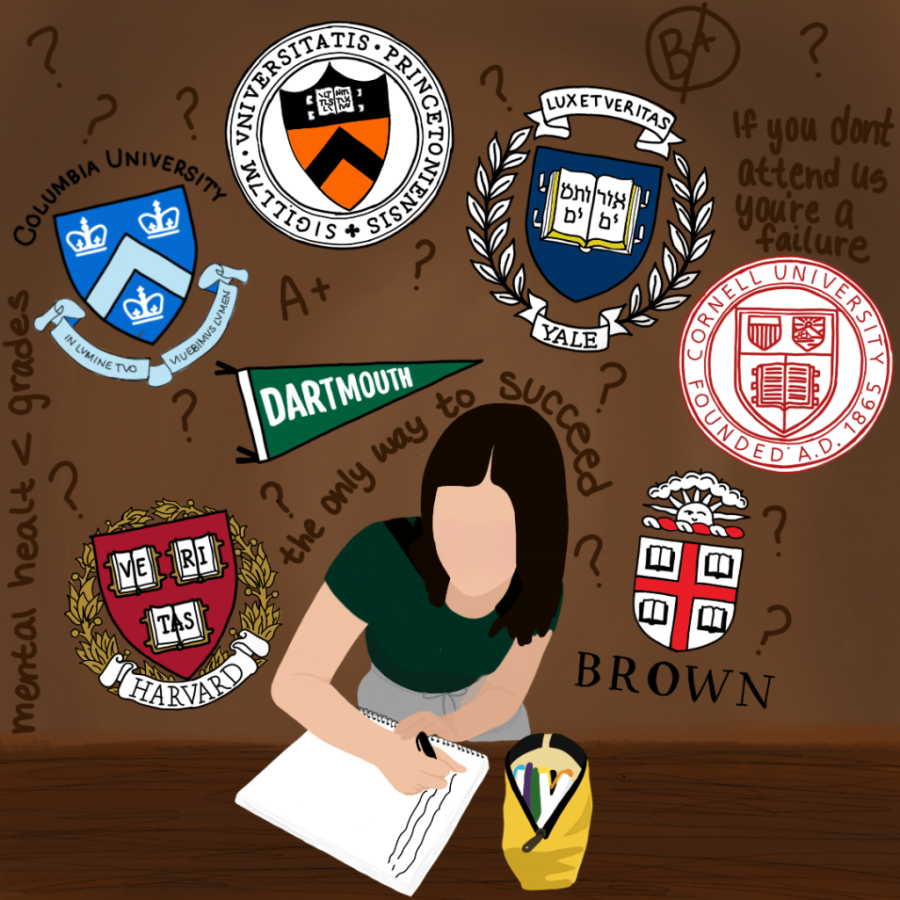Issues with Ivy Leagues
November 17, 2022
Ivy leagues are deemed to have special attributes to them. With their low chances of admission rate and high tuition costs, they are thought to have the best education in the country. The average acceptance rate of Ivy Leagues is just above 9 percent. Not to mention that you must maintain impeccable stats throughout high school, you must have almost all perfect grades in your classes, good SAT scores, impressive extracurriculars, and excellent college essays.
According to Crimson Education, “For most of the Ivy League schools, they expect as close to a 4.0 unweighted GPA as possible. However, the actual unweighted GPAs of students admitted could vary, with many around the 3.5-4.0 range.” A student must be “perfect” and be on top their classes in high school. This creates immense stress and pressure for an individual that it can make them feel overwhelmed. Freshman Ryan Batingan says, “I have experienced some sort of pressure from my family and my peers a lot of times.” It is no surprise that getting As require hard work and lots of dedicated time. A student may choose to spend their time studying instead spending it with their loved ones. This could play a role in developing depression and social anxiety. Sophomore Elena Gehrke says, “Kids our age should just focus on enjoying their lives and spending time with their loved ones.” Sacrificing spending time with one’s family over an Ivy League could be okay for some individuals, but you only get so much time with them.
Your college does not determine your career success and it does not matter whether you attend an Ivy League or a state college. According to Affordable Collegses Online, “Ivy League graduates can make a lot of money, but so can graduates from state schools. The return on investment of public colleges is double the return on investment of private colleges. Career success is ultimately determined by the student, not their school.” Whether you go to an Ivy League or a state college, it does not play a role in your career success because it is determined by the individual not the university. The only difference between an Ivy League and a state college is the difference in tuition prices. According to Affordable Collegses Online, “That private school grad who gets to retire three years early can also expect to spend four more years paying off student loan debt than a state school graduate.” If an individual endeavors to get into an Ivy League just for the sake of a successful career path, it would be pointless as Ivy League graduates accumulate debt during their education. The debts are likely to equal out the amount students would earn after 4 years of college at an Ivy League or state college.
Senior Giselle Batingan says, “I would choose to attend a state college as it is more affordable.” The high tuition prices of Ivy Leagues cannot be ignored as they are expensive even though their education materials do not differ much from state colleges. In terms of economic performance, an Ivy League is a poor investment for a lot of high school students because it is not profitable in the long run. According to The Balance, “The average cost of tuition alone for an Ivy League was $59,985 for the 2022-23 academic year.” It is a surprise that University of Washington has a tuition of $12,076 in-state and $39,906 out-of-state. Junior Nicolas Santi says, “I would choose state college because the Ivy tuition is overpriced.” Not a lot of students are able to afford the tuition or choose not to go to an Ivy League because it will not be financially supportive.
A student must be strategical when planning on landing a spot at an Ivy League. However, one may not be able to get into their dream school because of factors such as affirmative action, ethnicity, and your background. According to Shemmassian Academic Consulting, “Ivy League schools have a reputation for admitting legacies and other students who aren’t representative of the U.S.’s socioeconomic and racial diversity. They have also been criticized for failing to support undergraduate students of color. And a group of Asian American students recently sued Harvard for discriminating against them with their admissions policy.” The Ivy League admissions are a bit biased toward black people and it is a common practice done by many other colleges. Gehrke says, “Colleges want a diverse race in their campus, and it can be totally unfair for one race than the other.” Ivy Leagues have harsher standards because they want diversity in their campus. However, most of the time one race dominates over another which leads to a certain race having an advantage over another. To get rid of this, sixty percent of Americans voted to eradicate the affirmative action. Which would seem to help raise chances of college admissions.
Getting into an Ivy League brings stress and press to a student and that can deteriorate their physical and social health. Ivy League tuitions are extremely expensive which can accumulate to become your debt. These problems prove that Ivy League is not always “perfect”, and it will not set you up for career success.



